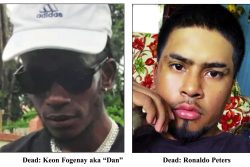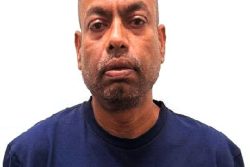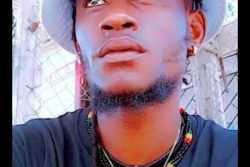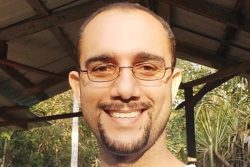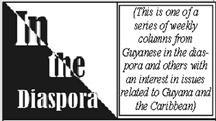 Every time we impose our will on another, it is an act of violence
Every time we impose our will on another, it is an act of violence
–Mohandas Karamchand (Mahatma) Gandhi
By The Caribbean Voice
The Caribbean Voice is a New York-based NGO that has been involved in social activism since its launch in 1998
The 16 Days of Activism Against Gender-Based Violence, a global campaign from 25 November through 10 December, took place this year against the backdrop of an unprecedented global outcry. Millions rallied behind the hash tag #MeToo and other campaigns, exposing the sheer magnitude of sexual harassment and other forms of violence that women everywhere suffer, every day. At the heart of this year’s theme, “Leave No One Behind – End Violence against Women”, for the International Day for the Elimination of Violence against Women (25 November) was the imperative to support those who are particularly vulnerable.
In fact, according to Time magazine, “ the hash tag #MeToo (swiftly adapted into #BalanceTonPorc, #YoTambien, #Ana_kaman and many others), which to date has provided an umbrella of solidarity for millions of people to come forward with their stories, is part of the picture, but not all of it.”
Time stated, “Women have had it with bosses and co-workers who not only cross boundaries but don’t even seem to know that boundaries exist. They’ve had it with the fear of retaliation, of being blackballed, of being fired from a job they can’t afford to lose. They’ve had it with the code of going along to get along. They’ve had it with men who use their power to take what they want from women. These silence breakers have started a revolution of refusal, gathering strength by the day, and in the past two months alone, their collective anger has spurred immediate and shocking results: nearly every day, CEOs have been fired, moguls toppled, icons disgraced. In some cases, criminal charges have been brought.”
Added Time, “The women and men who have broken their silence span all races, all income classes, all occupations and virtually all corners of the globe. They might labor in California fields, or behind the front desk at New York City’s regal Plaza Hotel, or in the European Parliament. They’re part of a movement that has no formal name. But now they have a voice.”
Sadly, this revolution has not touched the shores of Guyana, where sexual violence is still very much hidden for many reasons, including police complicity via bribery. Instead, a handful has been calling for a national conversation. But hasn’t a national conversation been ongoing for quite a while as so many talk up a storm? If simply talking in abstraction were the antidote to violence, then violence would be a non-issue, would it not? The reality is that talk, framed in a context that offers redress through practical action, is the only kind of talk that is meaningful. Yet while Guyana is saturated with abstract talk, action is almost invisible, except for the selfless work of a small band of NGOs and activists, with a small amount of similar work done by the government.
Earlier this month, the media reported on a murder suicide, on the Corentyne. A forty-year old woman was stabbed to death by her common law husband, who then took his own life. According to one media report, the woman revealed to her niece that she (the woman) was going to be killed. Why did the woman not feel able to report to the law and leave the home? Why did the niece not report to the law and encourage the woman to leave the home and find somewhere safe? Why did neither of them seek counseling for the woman and the husband?
The roadblock apparently is the two fold – otherization of the call to action and a perception that issues like this must either be kept hidden because of ‘shame’ or that it’s a waste of time to seek help. On the one hand almost all who suggest what should be done expect some hazy other to take action, as they remain dismissive of the call for abuse prevention to be everyone’s business, the need for each one of us to tackle the issue in our homes, communities and workplace as that is really where the walls of silence need to be broken down and misplaced concepts such as family honour and status need to be shunted aside. On the other hand the deafening silence fosters abuse, sometimes with fatal consequences, often because victims and others know not what to do and how to do it.
Against this background The Caribbean Voice (TCV) joins the call for the annual 16 days of activism against women violence to become activism in its real sense instead of rhetoric, photo ops and pageantry. Instead of walks, trees wrapping, photo exhibitions and the like, relevant ministries should embark on nationwide education/sensitization and training campaigns so women can be empowered to tear down the walls of silence and so that citizens can not only know what steps to take to tackle issues of violence against women and how to intervene to make women safe, but they can be motivated to take action and be provided with supports to be successful. This approach will also enable citizens to understand the other forms of abuse beyond physical and sexual – emotional, financial, psychological, verbal and spiritual – and would concretize abuse prevention as everybody’s business. As well scarce resources and efforts would be relevantly maximally used to bring about redress.
On the books Guyana has the Domestic Violence Act and the Sexual Offences Act but these laws are not enforced with any mechanism that provides teeth. Surely it is high time for police across the board to be sensitized with respect to these laws so that all laws are stringently applied nationally? And while TCV applauds the establishment of the Sexual Offences Court at the level of the High Court, we join the call for this court to be supplemented by a mobile court that would be able to hold sittings in every region on a regular, perhaps rotating basis, As well, these courts must be bolstered by a Special Victims Unit in the police force, which, according to Head of the Child Care & Protection Agency, Ann Green, can bring charges in 72 hours, in order to prevent perpetrators from moving out of their jurisdictions. Furthermore we join Red Thread activist Karen De Souza in calling for a specialized court at the level of the Magistrates’ Courts as well to handle cases of abuse.
Additionally, there is need for mechanisms to enable abused victims to break the silence by sharing their experiences and publicly calling out abusers as well as seek help. A hotline would be one such mechanism. Or perhaps the Suicide Helpline can be expanded to include abuse. Gatekeepers/lay counselors would be another mechanism. As well, the government should foster the creation of an app that would also enable sharing and reporting of abuse. Meanwhile, we urge all victims of abuse to report the abuse online on the page http://reportabusegy.com/ created by social activist Akola Thompson.
As well the government/relevant ministries must create and widely and continuously disseminate a list of all counselors, public and private, in the various regions as well as NGOs and other entities providing counseling such as the Domestic Violence Counseling Center at Corriverton, Guyana Foundation Sunset Centers, Monique’s Helping Hands, Help and Shelter, SASOD and so on. In fact the government should also provide support to the work of these entities, since they supplement the very limited service offered by government.
Also, the media has a significant role to play in the fight against all forms of abuse that goes beyond mere reportage and op eds or editorials. It must including publishing of information that would both educate the reading public and arm them with strategies to cope and bring about redress, including how and where to access necessary help. And it must provide a platform for women and others to break the silence and access help.
Meanwhile we note that the Ministry of Social Protection’s Sexual Offences and Domestic Violence Policy Unit (MSSODVPU) offers a range of services: shelter and temporary accommodation, financial assistance, rehabilitation, skills training, counseling, social work services, legal aid… So why is it that many cases of gender-based abuse continue to fester often with fatal consequences? For example, a mother of five has been enduring years of domestic abuse, threats to her life, and most recently rape and an acid attack by her 56-year-old ex-reputed husband in spite of repeatedly reaching out to the police. Even reactively this Unit should have been able to help this woman and prevent the recent acid attack and rapes.
Breaking the silence and being empowered to take action can only happen if victims and others know that resources and a network is available to support them, especially if /when they decide to walk away. Thus TCV calls upon the Ministry of Social Protection to set up offices in all ten administrative regions and engage in widespread and ongoing promotion as well as collaboration with the police and community based organizations so that its work can become proactively encompassing across Guyana. As well we urge that not only should orders of protection be urgently provided when requested but also that they should be enforced and supported by the police at all times.
Some years ago TCV launched an online petition calling for a registry of sex offenders to be raised. Now we are rooting for the realization of the Director of the Childcare & Protection Agency, Ann Green’s plan to have such a registry of sexual predators of children and we hope that plans for a similar registry for sexual predators of adults will also come into being in 2018. As well, we appeal to readers to please sign our petition calling for such a registry and urge others to do so by clicking on the ‘Petitions’ link on the left hand bar of the index page on our website – www.caribvoice.org – and then click on the ‘Registry of Sex Offenders’ link, so that we can boost the registry’s chances. There, our petition calling for the age of consent to be raised to eighteen years can also be accessed. Again we appeal to readers to please sign our petition and urge others to do so.
Finally we offer a number of free workshops, all of which address abuse. We urge communities, organizations and institutions to reach out to us so we can bring these workshops to you. The Caribbean Voice can be reached by email (caribvoice@aol.com, keshni.rooplall@yahoo.com, sixtusedwards@yahoo.com) text or phone call (697-9968, 659-9196, 6991351, 218-5054, 694-7433 or 644-1152). On our website – www.caribvoice.org – are links to all of our social media pages, through which coping information and strategies to tackle violence against women can be accessed and we can also be contacted.




